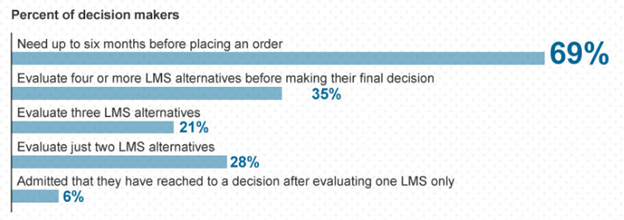Is It Time to Invest in a Learning Management System?
Shauna Carson
Some organizations may think that buying an LMS for their training is over-the-top. And maybe they have a point. An LMS is a big investment - in time and in dollars. Before you invest, there are a few things to consider, but rather than talk about reasons to make an LMS purchase, I'd like to discuss some common arguments you may hear against investing in an LMS. As you read, consider if any of these arguments ring true for your organization, and how you may counter them, or if they represent a real barrier.
Arguments Against Investing in an LMS
1. "What's in it for us?"
ROI - the three letters that quicken the pulse of senior management - is a major factor in deciding major business investments. The return on investment from an LMS does not show up on the company balance sheets and is often difficult to define. Will worker productivity increase because we have an LMS? Will an LMS improve revenues? How will an LMS affect the bottom line?
In other words, "Will an LMS make us money?"
Well, while an LMS does not directly affect your organization's profit centres, you can demonstrate a return on investment using the four steps described in Jill Walker's article The Learning Management System (LMS) as an Investment.
If you cannot demonstrate an acceptable ROI on an LMS, perhaps the time is not right for your organization to invest in one.
2. "It's a good idea, but let's hold off on an LMS for the moment."
Your management likes the idea of an LMS, but it's not something that they need right away. The way they see it is that things are fine right now and, while they may have to change in the future, they can cross that bridge when they get there.
Bringing an LMS onboard and moving the organization to eLearning is a major change that will take time for organization-wide acceptance. When you are faced with this type of mindset, there's very little point in pressing the matter. There's no point in pulling a Sisyphus and try to achieve the unachievable. Wait until the time is right.
It's also important to note that most organizations take their time in deciding whether or not to invest in an LMS. In its April 2015 LMS Industry User Research Report, Capterra reported that 69% of decision makers needed up to 6 months to decide before placing an LMS order. Be patient; the best thing you can do is give your decision-makers the information they need to make a decision.

Source: eLearning Industry: The Top LMS Statistics and Facts For 2015 You Need to Know
3. "An LMS is too expensive!"
Investing in an LMS is no small matter. There are costs for implementation, custom programming, support, licencing, maintenance, etc. and they add up.
There are a number of ways a software firm can charge its LMS user fees. Rates can vary from "free" to thousands of dollars per year depending on the system (so-called free LMS software often have associated costs). Capterra's Learning Management System Software Pricing Guide illustrates the range in fees.
Capterra's LMS Industry User Research Report found that organizations spend an average of $70,600 on their LMS annually. The chart seen here breaks out the average annual and monthy amount spent on an LMS depending on the number of learners using the system.

Source: Capterra - LMS Industry User Research Report
As you can see, buying, licensing and operating an LMS can be expensive. Make sure that your organization is ready to take on those costs.
4. "Our IT department is already stretched to the limit!"
Your management may argue that IT resources are used to support revenue-generating sectors of the organization and training is not one of them.
Let's face it, LMS implementation, operation and maintenance needs costly IT resources. For many companies, those resources are committed and may not be available for a project that may or may not generate ROI. LMS implementation can take a few days, a few weeks or longer depending on the system. Support and maintenance are sometimes offered by vendors, but that also comes at a cost.
Unless your organization can commit the time and IT resources to your LMS plans, it may not be ready for an LMS.
5. "This organization has trained employees for years without an LMS. Why should we change?"
You and your team think that investing in an LMS is important. But it's hard to ignore the fact that your company has done just fine without one. You need to look at your training program to see if there are serious gaps in training that cause shortfalls in your training goals or in overall performance. If there are none or, more likely, there are some but they can be easily managed, the money for a new LMS may be better spent elsewhere.
If any or all of these arguments prevail at your organization, you will need to take a step back on your LMS plans or come up with effective counters. If these objections are manageable or non-existent, your next step is to start your LMS research. To help you, here are links to three very helpful documents:
Capterra's The Top 20 Most User-friendly LMS Software
Conclusion
Some organizations rush into an LMS investment before being sure that the resources and infrastructure required to support that investment are available. Some may go ahead with an LMS purchase before all stakeholders are on-side. Either way, it's a bad move.
In this article, I have discussed five common arguments that indicate that an organization is not ready to invest in an LMS. Certainly, there are other reasons not to buy and there are a lot of reasons you should invest in an LMS. The key point is that you must make sure that your organization is aware of what an LMS purchase involves, and that it is ready to take on the expense and challenges of implementation.
Deciding if and when you are ready to take the LMS plunge is a decision that should be made with care. And when you do decide to buy, take your time to do your research so that you can choose the system and vendor that is the right fit for your organization.
Free eBook
LMS Vendor Comparison
Get the tips, tricks and templates you need to undertake a successful vendor comparison!
📘 Ready to Elevate Your Learning Strategy?
Explore our comprehensive library of eBooks and tools on learning resource development, competency-based learning, and LMS implementation. Transform your training programs with insights from industry experts and practical templates.
Shauna Carson
Shauna graduated from the University of Toronto in 2002 with a Master of Arts in English before moving home to Calgary to work in the fast-paced, detail-oriented oil and gas industry. Now certified as a technical writer, Shauna is comfortable writing in a variety of styles, and for a variety of audiences.

